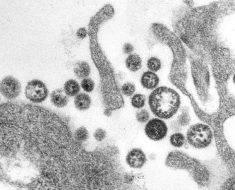WEDNESDAY, Dec. 9, 2020 — Loss of taste and smell are common in COVID-19 patients, and it often occurs before other symptoms, a new study says.
It included 93 people, average age 63, with COVID-19 who were admitted to an Italian hospital in March. None of them ended up in intensive care.
Loss of smell and taste was reported by nearly two-thirds (63%) of the patients, and lasted an average of 25 to 30 days among those 58 patients.
Loss of smell and taste was the first symptom experienced by 13 (22%) of the 58 patients, according to the study published online Dec. 9 in the journal Neurology.
“Loss of smell and taste are common in people who have COVID-19 infections, and our study found that these symptoms often occur before other symptoms, like fever or shortness of breath,” said study author Dr. Francesco Bax, from Santa Maria della Misericordia University Hospital in Udine, Italy.
“Because of that, clinicians should consider a patient’s loss of smell and taste an early indication of infection, one that is monitored closely while keeping that patient isolated, and possibly quarantined, until a definitive diagnosis can be made,” Bax said in a journal news release.
“While many people show evidence of COVID-19 infection in the lungs, we found there could be more at play than what a person’s lungs can tell us,” Bax said.
The researchers also analyzed all of the COVID-19 patients’ blood work for certain biomarkers of inflammation.
Compared to those who didn’t lose their taste or smell, those who lost their sense of smell had 23% lower levels of white blood cells (leukocytes).
This was particularly true of a specific type of white blood cell called neutrophils, which help the body fight infection. Neutrophil levels were 29% lower in patients who lost their sense of smell.
“More research is needed to determine whether this decrease in white blood cells we observed can be used to help identify patients in the early stages of COVID-19 infection,” Bax said.
“For people whose first symptoms were loss of taste and smell, we found very few had nasal congestion, so we think obstruction of the nasal passages is an unlikely cause of these symptoms,” Bax said. “However, the association between a blood cell imbalance and losing your sense of smell may help in identifying patients at risk.”
Source: Read Full Article





